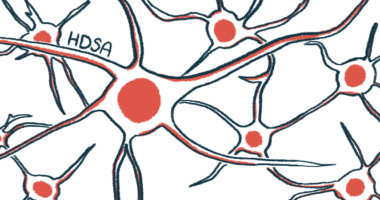Making promises has new meaning for my gene-positive wife
Each vow or commitment looks different in life with Huntington's disease

I’ve learned a lot from my wife, Jill, who is gene-positive for Huntington’s disease (HD), about the importance of the phrase “I promise.”
In the past, I often made promises without considering what they meant to others. As a child, I’d say, “I promise I’ll clean my room,” and then spend the next two hours reading a book. Growing up, my promises were well-intentioned, but I didn’t quite deliver on them. For instance, I’d tell a friend, “I promise I’ll be there on time,” but because I have attention-deficit/hyperactivity disorder, I’d get distracted and arrive late.
I always intended to do what I said I would, but if reality turned out differently, life would continue to move forward, and no one would be hurt. Right?
But after I met Jill, I noticed she never said “I promise” casually, and when I did so, she’d get upset. I never understood why until she explained it to me.
When Jill was young, she’d be distressed if her plans were changed or canceled. She noticed that “plans” held a different meaning for others. She knew she couldn’t get upset every time her schedule changed, so she worked to adjust her outlook. It took her time, but she eventually understood that plans are not set in stone for some people. She’d try to figure out what someone really meant when they agreed to an event.
She also wanted to make sure people understood her commitment — that by making plans, she was giving weight to what was important to her. She wanted to show her friends and family that they could count on her.
“I promise” fit perfectly. In other words, when Jill makes a promise, she delivers on it — regardless of the circumstance.
Enter Huntington’s
Now, imagine my confusion when I recently awoke on the morning of a work event that Jill had promised to attend with me, only to find a note in the bathroom saying she wasn’t going to make it.
When I heard her stir, I returned to the bedroom and asked why she didn’t want to go. Jill said it was “no big deal” and went back to sleep.
I chose not to push her at that point and went downstairs. As it got closer to the time I needed to leave, she came down the stairs, all dressed up.
“I thought you decided not to go with me,” I said.
Jill looked at me, confused.
“I thought you weren’t going to go with me,” I repeated.
Her face changed. She said she’d decided she wasn’t going to make it to the Apple store that morning. I’d forgotten she wanted to stop to have her iPhone looked at, since it’d been acting wonky and the store was only 20 minutes from my work.
Because she has sensory issues, and because she’s been feeling overwhelmed lately as a result of HD, Jill didn’t want to deal with all the people at the store and at my work event.
My eyes teared up when I realized she was going to fulfill her promise to me.
She told me that even though the words “I promise” are still important to her, she realizes that her HD symptoms may prevent her from keeping her promises. For example, we recently made plans to see a movie that interested Jill, but the night of the showing, she told me she wasn’t up for it. We’d already purchased the tickets, so this behavior concerned me. She said she was fine, but just didn’t have the motivation to go.
A few days later, she told me she was sad we didn’t go to the movie, especially because she recognized that HD-induced apathy was the reason. She doesn’t want that to happen again, but she knows it’s possible. As we talked, she explained that she was updating the phrase “I promise” to include “… as long as my HD symptoms allow me.”
In the meantime, I hope she understands that she’s inspired me to take my promises more seriously. In other words, I’ll take care of her, even when she’s unable to honor a commitment.
I promise.
Note: Huntington’s Disease News is strictly a news and information website about the disease. It does not provide medical advice, diagnosis, or treatment. This content is not intended to be a substitute for professional medical advice, diagnosis, or treatment. Always seek the advice of your physician or other qualified health provider with any questions you may have regarding a medical condition. Never disregard professional medical advice or delay in seeking it because of something you have read on this website. The opinions expressed in this column are not those of Huntington’s Disease News or its parent company, Bionews, and are intended to spark discussion about issues pertaining to Huntington’s disease.








Jean Miller
With my daughter Kelly, who had JHD, it was important to never make a promise to her that I couldn't keep. That was especially true if a time was involved like when I'd be home. She made me very punctual! I learned from a dear HD positive friend years ago [Lou Wilkerson-Canada] that a person with HD is afraid they will forget something they want to do so they will keep pestering you on when you will be doing this whatever for them. However, if you reminded her of your promise, like this Tuesday I promise I will take you to the shell store saying that is in 3 more days then remind her each day she felt secure in the fact you hadn't forgotten! Then on the morning of that day remind her that in so many hours we'll be going to the shell store to help her remember. ;-)
Carlos Briceño
Great advice, Jean.
I am sorry to hear you had a daughter with JHD. I am sure your daughter benefited from your positive problem-solving skills.
Jill describes it as a "thought loop" that you just can't get out of your head, and, eventually it is too hard to keep inside.